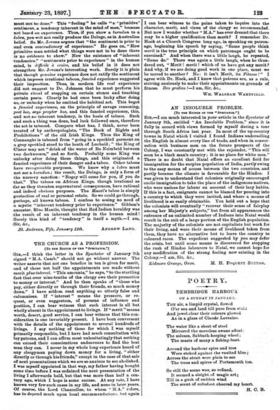THE CHURCH AS A PROFESSION.
[To THE EDITOR 01 THE *131.11CTATOR."] SIE,—I think the letter in the Spectator of January 9th signed " M.A. Camb." should not go without answer. The writer asserts that not one benefice in ten is given for merit, and of these not half the appointments are made without merit plus interest. "This amounts," he says, "to the startling fact that over nine-tenths of the clergy owe their promotion to money or interest." And he then speaks of "those who pay, either directly or through their friends, so much money down." I have seldom read anything so utterly false and -calumnious. If " interest " means the pressure, or re- -quest, or even suggestion, of persons of influence and position, I can bear witness that such interest is all but wholly absent in the appointment to livings. If" merit "means worth, desert, good service, I can bear witness that this con- sideration is one invariably present. I have been conversant with the details of the appointment to several hundreds of livings. I say nothing of those for which I was myself primarily responsible, but I have had much consultation with day patrons, and I can affirm most unhesitatingly that nothing can exceed their conscientious endeavours to find the best man they can. I never in my whole long experience heard of any clergyman paying down money for a living, "either directly or through his friends," except in the case of that sale of next presentations which we are so anxious to see abolished. I was myself appointed in that way, my father having bought some time before I was ordained the next presentation of the living I afterwards held, but that was more than half a cen- ttuy ago, which I hope is some excuse. At any rate, I have known very few such cases in my life, and none in later years. Of coarse, the Lord Chancellor, to whom " M.A." refers, has to depend much upon local recommendations, hut again
I can bear witness to the pains taken to inquire into the character, merit, and views of the clergy so recommended. But now I wonder whether " M.A." has ever dreamt that there may be a higher qualification than merit? I remember Dr. Hook at a Church Congress long ago, in speaking on patron- age, beginning his speech by saying, "Some people think merit is the true principle on which patronage ought to be exercised." And when there was a little laugh, he repeated. "Some do." There was again a little laugh, when he thun- dered out, " Merit ! merit ! which of us have got any merit ? And why, if we are doing good work in one place, mast we be moved to another ? No: it isn't Merit, its Fitness ! " I agree with Dr. Hook, and I know that patrons are, as a rule, striving anxiously to make their appointments on grounds of fitness. Deo gratiaa !—I am, Sir, &e., WM. WILSHAM WAKEFIELD.


































 Previous page
Previous page